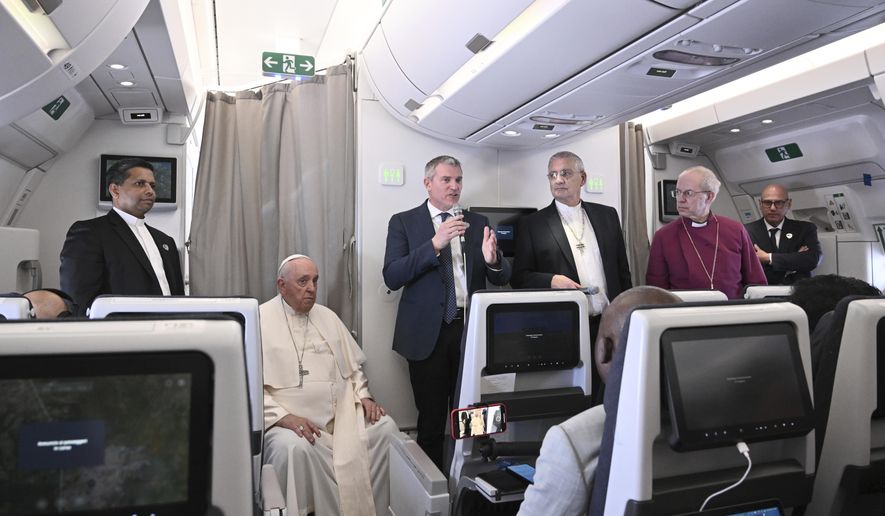ABOARD THE PAPAL PLANE — Pope Francis was backed by the ceremonial head of the Anglican Communion and top Presbyterian minister in calling for gays to be welcomed by their churches as he again decried laws that criminalize homosexuality as unjust.
The three Christian leaders spoke on LGBTQ rights during an unprecedented joint airborne news conference Sunday while returning home from South Sudan, where they took part in a three-day ecumenical pilgrimage to try to nudge forward the young country’s peace process.
They were asked about Francis’ recent comments to The Associated Press, in which he declared that laws that criminalize gay people were “unjust” and that “being homosexual is not a crime.”
South Sudan is one of 67 countries that criminalizes homosexuality, 11 of them with the death penalty. LGBTQ advocates say even where such laws are not applied, they contribute to a climate of harassment, discrimination and violence.
During the news conference on the way back to Rome, Francis specifically didn’t repeat that “being homosexual is not a crime,” perhaps to not antagonize his South Sudanese hosts, who had originally objected to his comments to the AP.
“If he (Pope Francis) is coming here and he tells us that marriage of the same sex, homosexuality, is legal, we will say no,” Michael Makuei Lueth, South Sudan’s information minister, said after the pope’s AP interview and before his visit.
PHOTOS: Pope, Anglican, Presbyterian leaders denounce anti-gay laws
On Sunday, Francis referred to his Jan. 24 comments to the AP and repeated that such laws are “unjust.” He also repeated previous comments that parents should never throw their gay children out of the house.
“To condemn someone like this is a sin,” he said. “Criminalizing people with homosexual tendencies is an injustice.”
“People with homosexual tendencies are children of God. God Loves them. God accompanies them,” he added.
The Archbishop of Canterbury, Justin Welby, recalled that LGBTQ rights were very much on the agenda of the Church of England, and said he would quote the pope’s own words when the issue is discussed at the church’s upcoming General Synod.
“I wish I had spoken as eloquently and clearly as the pope. I entirely agree with every word he said,” Welby said.
Recently, the Church of England decided to allow blessings for same-sex civil marriages but said same-sex couples could not marry in its churches. The Vatican forbids both gay marriage and blessings for same-sex unions.
Welby told reporters that the issue of criminalization had been taken up at two previous Lambeth Conferences of the broader Anglican Communion, which includes churches in Africa and the Middle East where such anti-gay laws are most common and often enjoy support by conservative bishops.
The broader Lambeth Conference has come out twice opposing criminalization, “But it has not really changed many people’s minds,” Welby said.
Friction has been simmering within the global Anglican Communion for many years over its 42 provinces’ sharp differences on whether to recognize same-sex marriage and ordain LGBTQ clergy.
Welby has been caught in the middle as both the top bishop of the Church of England and the ceremonial leader of the Anglican Communion, which is one of the world’s largest Christian communities. Welby has acknowledged “deep disagreement” among the provinces over LGBTQ issues and has said neither the Lambeth Conference nor he individually has the authority to discipline a member province or impose demands on it.
The Rt. Rev. Iain Greenshields, the Presbyterian moderator of the Church of Scotland who also participated in the pilgrimage and news conference, offered an observation.
“There is nowhere in my reading of the four Gospels where I see Jesus turning anyone away,” he said. “There is nowhere in the four Gospels where I see anything other than Jesus expressing love to whomever he meets.
“And as Christians, that is the only expression that we can possibly give to any human being, in any circumstance.”
The Church of Scotland allows same-sex marriages.
Catholic teaching holds that gay people must be treated with dignity and respect, but that homosexual acts are “intrinsically disordered.”




Please read our comment policy before commenting.